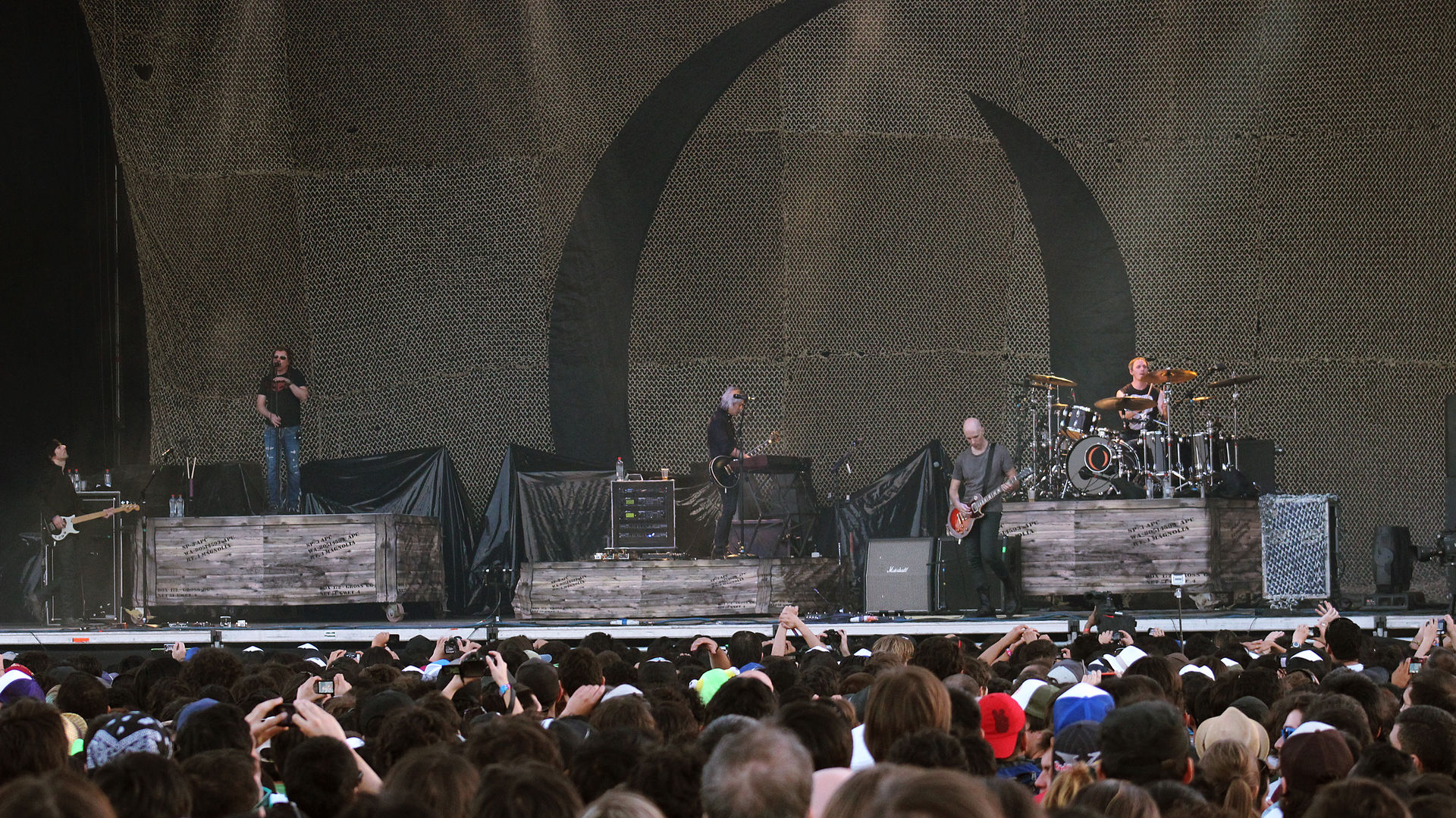
By TJ GIBSON
Staff Writer
How does one eat an elephant? Well, if the age-old aphorism is to be believed, one bite at a time. So, with that in mind, how does a band who has been away for nearly a decade and a half tackle the mammoth task of crafting a comeback album worthy of their discography? Much the same, really. And thankfully, A Perfect Circle knows this. As one of the bonafide staples of 2000s hard rock, singer Maynard James Keenan’s (also, notably, of Tool fame) A Perfect Circle has been a sorely missed entity among genre compatriots in the fourteen years since its previous full-length release, 2004’s mostly-covers political escapade, “eMOTIVe.”
With the world a much different place now than it was then, fans have understandably approached this release with an air of apprehension, worried that the group’s simultaneously introspective and socially-charged rhetoric wouldn’t translate to today. To their (and my) pleasant surprise, this isn’t the case. Not only does “Eat the Elephant” play well as a striking sociopolitical manifesto, but it is also simply a downright pleasure to listen to from top-to-bottom. Though no doubt a sharp stylistic departure from previous releases in more ways than one, the change is both refreshing and welcome. Thus, with that being said, let’s get right into it.
We start out with the coffee shop indie-esque “Eat the Elephant,” which quickly establishes itself as the perfect title track in its subtly metaphorical references to the daunting creation of the comeback album itself (“crippling undertaking,” “where to begin eludes me,” “just take the step,” etc.), as well as its blunt establishment of the somber tone that will saturate the rest of the proceedings. Indeed, “Eat the Elephant” strikes the listener as equal parts strange and yet somehow effective, in spite of — or perhaps, because of — its intriguing blend of mellow and melancholy. This is a good thing because the rest of the album will be no different.
Following on that is the entrancing and atmospheric “Disillusioned,” in which Keenan begins his socio political commentary by condemning us as “addicts of the immediate,” of things that “keep us obedient and unaware,” such as our smartphones and beloved social media. While this is a message that is admittedly a little broken in by this point, the band seems to be well aware of that, and thus focuses on simply making their delivery of it as powerful and inspiring as possible. The main reason why this song is so powerful, though, has less to do with the lyrics and more to do with the composition as a whole. For example, the band utilizes dynamics flawlessly on this.
song, with the few quieter passages effectively complimenting the louder ones so as to crest the momentum just right.
Next, we move out of the sociopolitical and into just the straight-up political, as Keenan takes a moment to reflect on a Trump-led America in “The Contrarian.” While the song never feels quite sad per se, it does come off as reflective and perhaps even sorrowful in regards to our current state, with Keenan reminding us of the nature of the man we’ve so recklessly put into power. “Within everyone, a scale, a voice,” cries Keenan, “everyone but him.” This, of course, may put off the Trump supporters among the APC fanbase, but it feels like something that still needs to be said. Plus, Keenan has never been one to shy away from controversial positions.
“The Doomed” is the perfect example of this. Over haunting keys and thick guitar riffs, Keenan bluntly asserts the fact that, as seemingly no one is willing to help his fellow man anymore, we are back to a survival of the fittest, every-man-for-himself environment. Keenan insists that, in this brave new world, the “rich,” “envious,” and “gluttonous” are blessed, while the “pious,” “pure of heart,” and “peaceful” are doomed. And how does the singer feel about that? “F*ck the doomed, you’re on your own.”
As we approach the midway point of the album, we’re treated to the poppy and uncharacteristically major-keyed “So Long, and Thanks for All the Fish,” which, though thoroughly unconventional, definitely doesn’t let up the streak of wordly commentary established thus far. While “So Long” does briefly refrain from sociopolitical stuff to discuss the recent deaths of a few pop culture icons such as Carrie Fisher and David Bowie, its main focus is planted firmly in its joyously nihilistic acceptance that the end of the world is definitely coming for us, our guns and our fancy water. It seems over-the-top out of context, but it actually works quite well as an almost Shakespearean display of comic relief among the relative bleakness of the other songs.
Channeling a bit of the classic APC aggression while still remaining fairly stripped down and moody, drum and piano driven track, “TalkTalk” laments on the comical futility of statements like “thoughts and prayers” made in the wake of tragedies. The song points out that if one really wanted to help, they would be too busy doing so to waste time posting on social media. In a simultaneous condemnation and call-to-action for the bleeding hearts and hashtag activists alike, Keenan reminds us with immediacy in his voice: “don’t be the problem, be the solution.” It’s a message as old as time, but no less imperative in today’s world.
The next and oldest track in the bunch (an earlier version was already released as a one-off single in 2013), “By and Down the River” predictably has the most in common both sonically and thematically with the group’s earlier works. To its credit, this trait suits the poignant track just fine. With the absolutely gorgeous interplay between guitar and piano here creating the perfect bed for Keenan to lay his Zeppelin-esque croons and cries upon, this track easily earns a claim as one of the album’s major standouts.
Following that is “Delicious,” which is perhaps the weakest link in the tracklist, though still not all that bad. While its execution is a little heavy-handed at times (“not unlike you to heedlessly hoist away your smug grenade, arrogant and insolent”), it’s sufficiently catchy enough to work just fine, and besides, it’s as quickly forgiven as it is presented when it swiftly forays into the proceeding instrumental interlude track, “DLB.” Speaking of which, there’s not really much to say about the two minute interlude, other than that it’s a gorgeous and welcome reprieve that transitions its predecessor into the following track with a level of elegance typically reserved for the proggier exploits of Keenan’s Tool. Given the next track’s stylistic departure, though, this is a much-needed addition.
Second only to “The Contrarian” in its political overtones is “Hourglass,” an alt- rock-meets-EDM bopper whose bass-heavy beats demand movement while Keenan unapologetically throws both sides to the wolves and all caution to the wind. No doubt, the listener should be well-acquainted with Keenan’s candid commentary by this point in the collection, but it still comes off jarring — as it well should — when the singer asserts that, in the end, both sides lose if the world ceases to exist. “No hope left in the hourglass,” indeed.
Nearing the end is the crown jewel of “Elephant,” the absolutely flawless “Feathers.” I simply cannot overstate how good this song is. Though fans got a glimpse at its potential in earlier forms displayed during live performances last year, it is truly and fully realized here in all its lush piano, guitar, and cello glory — which somehow still don’t even hold a candle to the top-notch performance of Keenan. As a middle-aged singer who has certainly mellowed out from his younger years of reckless abandon, it’s refreshing to know that instead of trying to hold onto those days, Keenan instead opts to become more clever in his delivery, displaying a newfound level of naked vulnerability in the beautifully delivered melodies he sings.
The closing track, “Get the Lead Out,” is refreshingly unconventional (influenced in equal parts by both traditional Chinese music and modern indie pop), not to mention the perfect conclusion to the album’s themes with “cry-me-a-river” lyrics such as “suck it up, buttercup” and “no time to coddle you” aimed squarely at today’s youth. As thinly-veiled in its pot shots at Millennials as it is in its influence from Keenan’s other, weirder project, “Puscifer,” this tune is as infectious as it is irreverent. With a length of six minutes and forty seconds, it has no right to be nearly as catchy and consistently interesting as it is. And yet, like the rest of this excellent album, it doesn’t care what it has the right to do; it just does it.
Thus, in conclusion, “Eat the Elephant” is a truly masterful return to form for one of modern rock music’s true royalty — a comeback of epic proportions that most bands could only dream of. And while it’s certainly a departure from what’s come before, that’s only to its benefit. After all, what “Elephant” may be lacking in the hard- rocking, wall-of-sound bombast of earlier efforts it more than makes up for in hauntingly beautiful atmosphere and unabashed sociopolitical commentary. Each song is a gorgeous display of earworm songwriting and an absolute joy to dissect lyrically, with repeated listens gloriously rewarded. Needless to say, A Perfect Circle is back with a vengeance, primed and ready to take the rock world over once more.
That being said, then, one has to wonder: could we be looking at the beginning of a new Maynard James Keenan renaissance after over a decade of comparative quiet? With his other main band, Tool, currently hard at work recording their own long-awaited comeback album, it certainly seems so. And as a fan of fearless music with something to say, I certainly hope so.


